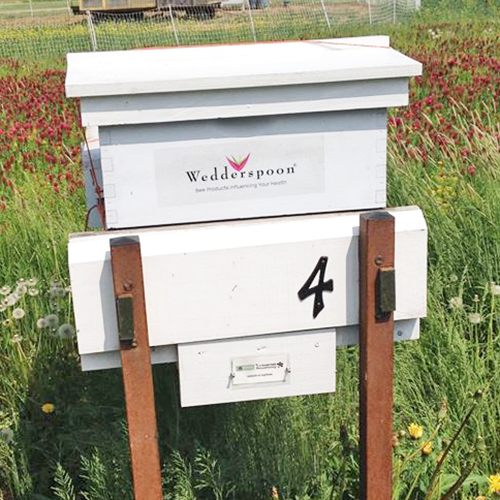The Honeybee Conservancy at Rodale Institute was started in 2012 in response to colony collapse disorder and the major health problems that have devastated the honeybee population in North America. They believe that individual honeybee stewards are one of the solutions to this problem. ‘Coach’ Mark Smallwood, the Director of Rodale Institute, shares how his goal for the Conservancy mimics Rodale Institute’s very first study on organic vs. conventional farming methods in stating:
“We’re most well-known for a study we started back in 1981 called the Farming Systems Trial so it’s a 34 year study, it’s the longest of its kind in the United States and it’s growing conventional right next to organic produce and so that’s sort of the routine that we follow – we try to mimic anything else that we do in this realm. So right now we have conventional hives and organic hives. They’re not all at the Rodale Institute they’re on 3 different sites but we’re going to do conventional treatments on half and organic treatments on the other half and begin to collect that data and really focus on hive health, not honey production but hive health. Just in the short-term, we’re seeing the organic hives doing much better than the conventional but we want to collect good data and keep going over the next couple years. Our hypothesis is that the conventional treatments do harm to the hive bodies, the organic does not. That’s what we’re trying to prove.”
The Conservancy promotes healthy beekeeping practices through education and outreach and includes classes in sustainable beekeeping practices, support for beginner beekeepers through the network and hive hosting on their 333-acre organic farm.
We are thrilled to have our own hive at the Conservancy and hope to inspire others who can’t keep bees on their own properties to do the same! Find out more information about the Honeybee Conservancy and Rodale Institute here. You may also learn more about our partnership here.
Whether you’re a green thumb with a garden or a city-dweller, we have compiled a list of ways you can partake in the effort to save the bees.
- Banning pesticides and chemicals from your garden creates an environment in which pollinators can thrive.
- Just like humans, bees love diversity in their diet! Try to plant a varied selection of plants to supply pollinators with an abundance of pollen and nectar.
- Along with native plant species, plan an herb garden with anything in the mint family, including perennial sages, and allow them to flower to really attract native bee species.
- Make sure to avoid hybrid plant varieties as they often do not product as much nectar or pollen as heirloom varieties!
- Create habitats for wild bees if you have the space – leave branches, bare ground and natural shelters for bees rather than landscaped and manicured lawns.
- Choose Non-GMO and organic products whenever possible to support those who are also doing their part to help save the bees!














